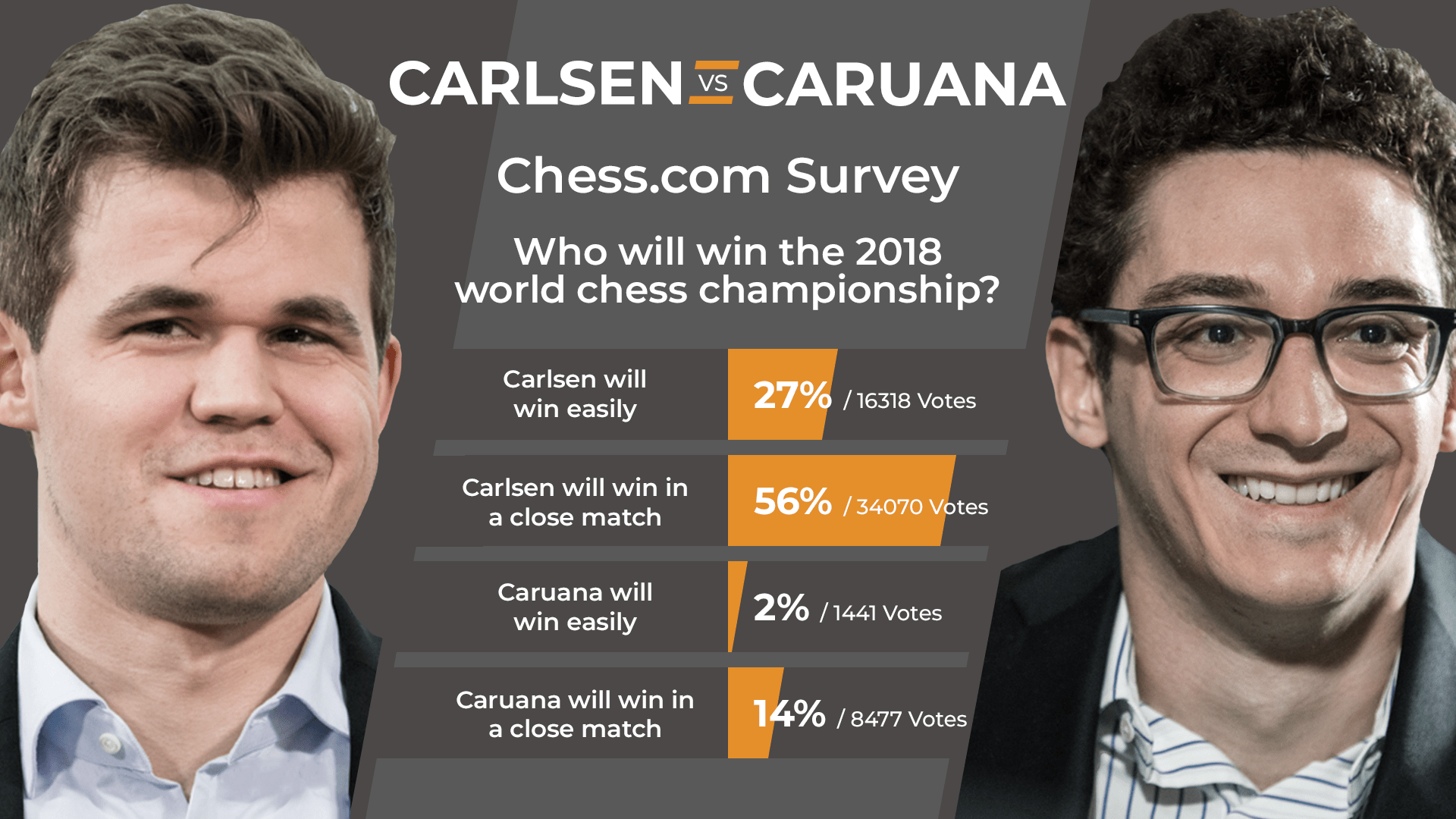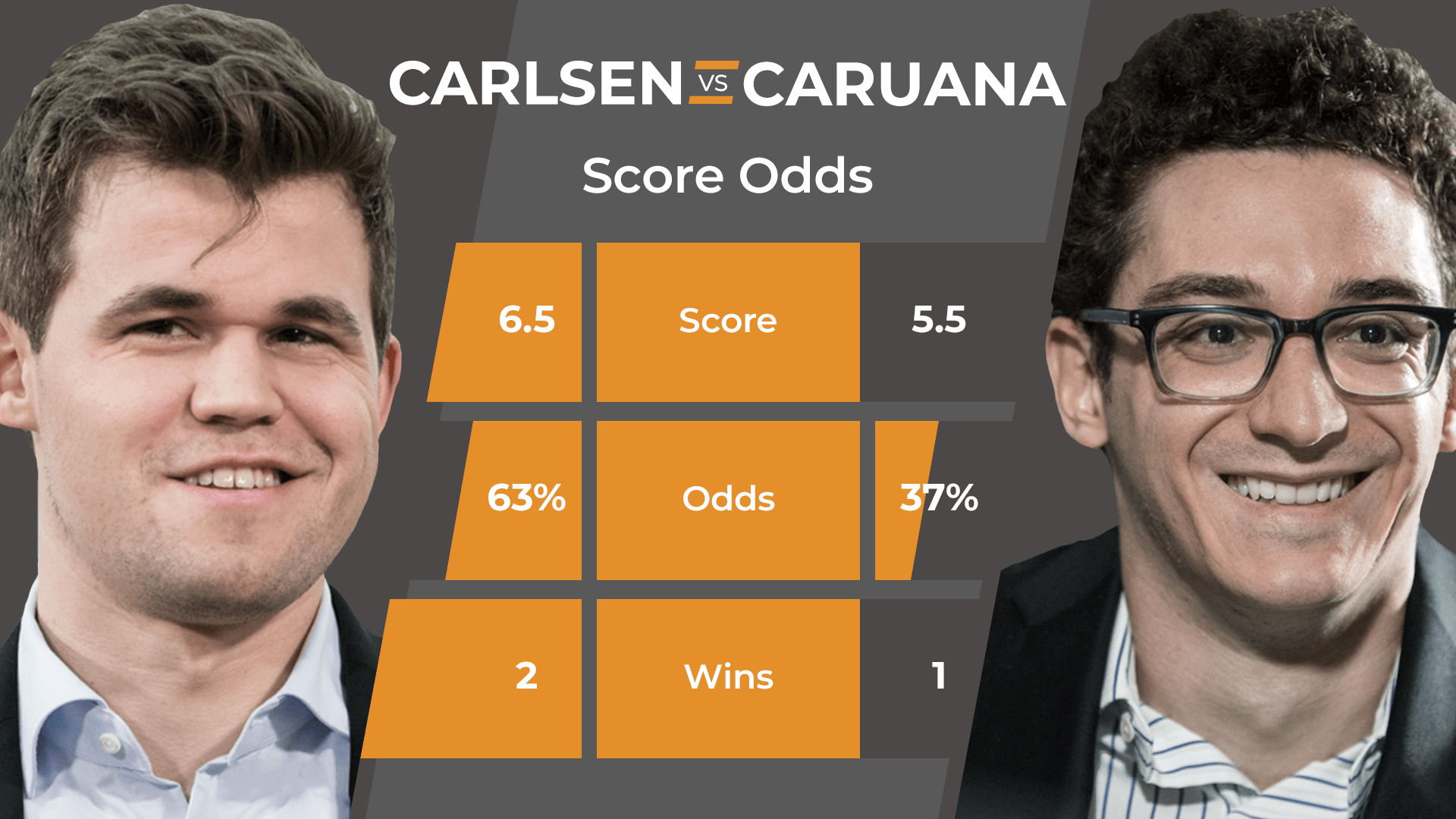
Carlsen vs Caruana: CAPS Predicts The 2018 World Chess Championship
The much-anticipated 2018 world chess championship between Magnus Carlsen and Fabiano Caruana will take place from November 9-28 in London. On the Chess.com homepage poll, 83 percent predict Carlsen will win the match. Just two percent of voters believe Caruana will "win easily."

Using past results, FIDE ratings, and Chess.com's Computer Aggregated Precision Score (CAPS), we try to determine how likely each outcome is, and what each player needs to do to win the match.
Strength Difference
Magnus Carlsen first reached number one in the world rankings in January 2010, and has been a dominant force ever since. Magnus has been rated as high as 2882 and currently sits at 2835. We have seen many players climb to the number-two spot in the rankings in that time frame, all of them slipping back down to earth within a couple of years.
Fabiano Caruana reached number two in the world rankings in October 2014, slipped for a bit, and now is back to his runner-up position, sporting a FIDE rating of 2832. Would it be accurate to say that Carlsen is three Elo points stronger than Caruana? To answer this question, let's dive into some data.
- Classical Head-to-Head
Since June of 2012, the pair has played in 29 classical games. Carlsen has won nine (31 percent), they've drawn 15 (52 percent), and Caruana has won five (17 percent). Carlsen's average rating over those games was 2854 and Caruana's 2796. Carlsen's score of 0.57 points per game is slightly underperforming his rating edge of 58 points. If the Elo ratings are a true measure of current strength, one could argue that Caruana is in a virtual tie right now as Carlsen in classical strength, once you factor in Caruana's slight overperformance against Carlsen.
- Classical Performance Rating
Despite Caruana's recent successes bringing his rating within three points of Carlsen, their performance ratings over the years tell a different story. Carlsen's performance rating is consistently over 2800, and his 2018 performance rating is 17 points higher than Caruana's (2841 and 2824, respectively). If the players are approximately 15-20 Elo points apart in true strength, Carlsen will be expected to score between 0.52-0.53 points per game.

- Computer Aggregated Precision Score (CAPS)
In a 2017 article by Danny Rensch titled Who Was the Best World Chess Champion in History? just three champions had a CAPS greater than 98. Sergey Karjakin's CAPS was 97.95 in the five-year period leading up to his 2016 world championship match against Carlsen.
Here's how the 2018 contenders stack up over since 2004:

What does this chart tell us?
1) These are two of the most accurate players of all time!
2) Carlsen is the more precise player, consistently 0.43-0.53 higher in CAPS between 2016-2018.
Match Simulation
In order to simulate the 12-game world championship match we need some input parameters. The two main factors are the strength difference between the players and the expected draw rate. Based on our data above we are going to estimate Carlsen should score between 0.52-0.53 points per game. The draw rate in Carlsen's previous world championship matches sits at 73 percent in classical games.
That's slightly higher than the 66 percent draw rate in five previous world championships between 2006-2012. We will estimate a draw rate at approximately 70 percent for this match.
If the match ends in a tie, the first tiebreak match is a series of four rapid games. If the match is still tied, multiple sets of two blitz games are played until a winner is determined. Carlsen has a 91-point Elo advantage in rapid, and 172-point Elo advantage in blitz.

If the match goes to tiebreaks, Carlsen has an 85 percent chance to win the match due to his dominance in rapid and blitz.
CAPS by Game Segment
Going back to 2008 for Carlsen and 2010 for Caruana, the Chess.com statistics team calculated the average CAPS for piece count on the board. Caruana holds a small CAPS advantage in the opening. Carlsen opens up a wide margin in the middlegame, and Carlsen has a small CAPS advantage in the endgame. It's safe to say both players are extremely strong in the endgame with a CAPS above 99.

Conclusions
Official Match Prediction
Based on all of the data analyzed, I am predicting Carlsen to win the match 6.5-5.5 in the classical portion. Slightly worse than the simulations, I'm setting the odds to favor Carlsen 63 percent to 37 percent, including wins in the tiebreak portion.
The match will be close, and it will be a battle of two extremely precise players based on CAPS.

How Carlsen Wins
Carlsen will most likely win the match in the classical portion, but he is also a large favorite if the match goes to tiebreaks. Psychologically, this should be a huge advantage for Carlsen, knowing that a 6-6 tie in the classical portion increases his odds in comparison to the start of the match.
If Carlsen can reach equal middlegame positions consistently, expect this match to go in Magnus' favor.
Here's an example from Altibox Norway 2018 of Carlsen outplaying Caruana in the middlegame and following through with the endgame conversion.
How Caruana Wins
Caruana is known for his opening preparation, and he is going to need to surprise Carlsen in a few games. If Caruana can avoid neutral or slightly worse middlegame positions, he should be able to hold his own in the endgame. Caruana also needs to strike first in this match.
In simulations, Caruana wins the match 55 percent of the time when he wins the first classical game. On the other hand, if Carlsen wins the first game, Caruana's odds plummet to a 12 percent chance of winning the match.
Here's an example from Norway Chess 2015 of Caruana's slight opening edge heading straight to the endgame, where he can fight on level terms with Magnus in terms of precision. I don't expect to see any Berlins out of Magnus in this match.
What are your thoughts on the match? Please let us know below!




